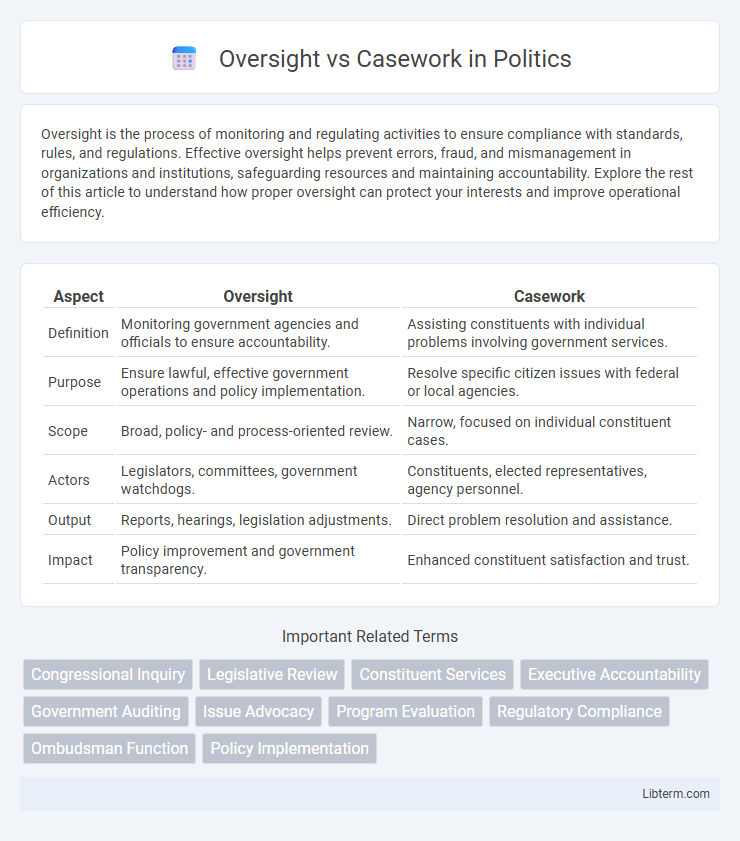Oversight is the process of monitoring and regulating activities to ensure compliance with standards, rules, and regulations. Effective oversight helps prevent errors, fraud, and mismanagement in organizations and institutions, safeguarding resources and maintaining accountability. Explore the rest of this article to understand how proper oversight can protect your interests and improve operational efficiency.
Table of Comparison
| Aspect | Oversight | Casework |
|---|---|---|
| Definition | Monitoring government agencies and officials to ensure accountability. | Assisting constituents with individual problems involving government services. |
| Purpose | Ensure lawful, effective government operations and policy implementation. | Resolve specific citizen issues with federal or local agencies. |
| Scope | Broad, policy- and process-oriented review. | Narrow, focused on individual constituent cases. |
| Actors | Legislators, committees, government watchdogs. | Constituents, elected representatives, agency personnel. |
| Output | Reports, hearings, legislation adjustments. | Direct problem resolution and assistance. |
| Impact | Policy improvement and government transparency. | Enhanced constituent satisfaction and trust. |
Introduction to Oversight and Casework
Oversight involves monitoring government agencies and programs to ensure accountability, efficiency, and compliance with laws. Casework refers to direct assistance provided by legislators to constituents in resolving individual problems with government services. Both functions are essential for maintaining responsive governance and addressing systemic and personal issues within the public sector.
Defining Oversight: Scope and Purpose
Oversight involves systematic monitoring and evaluation of government agencies and programs to ensure accountability, transparency, and efficiency in public administration. It encompasses a broad scope including legislative review, audits, investigations, and policy analysis to prevent misuse of resources and promote adherence to laws. The purpose of oversight is to safeguard public interest by identifying issues, enforcing compliance, and recommending corrective measures.
Understanding Casework: Key Functions
Casework involves assisting constituents with individual problems such as resolving issues with government agencies, navigating bureaucratic processes, and securing benefits. It requires personalized attention and direct intervention to address specific concerns related to social services, immigration, or veteran affairs. Effective casework strengthens community trust by providing practical support and timely solutions tailored to individual needs.
Historical Evolution of Oversight and Casework
Oversight and casework have evolved distinctly within government functions, with oversight historically developing as a formal mechanism for legislative bodies to monitor and regulate executive actions, especially since the Progressive Era in the early 20th century. Casework emerged as a constituent service tool, becoming more prominent in the mid-20th century as elected officials sought direct engagement with voters by addressing individual problems involving federal agencies. The historical evolution of oversight expanded from rudimentary review to comprehensive investigations, while casework solidified its role in enhancing representative accountability and responsiveness.
Differences Between Oversight and Casework
Oversight involves monitoring and evaluating government agencies or programs to ensure compliance with laws, efficiency, and accountability, often conducted by legislative bodies. Casework refers to helping individual constituents resolve problems with government services, focusing on personalized assistance rather than broad policy evaluation. The primary difference lies in oversight's systemic approach to governance versus casework's direct support to individual citizens.
Benefits of Effective Oversight
Effective oversight enhances government transparency by continuously monitoring agency performance and ensuring compliance with laws and regulations. It promotes accountability through systematic review of public programs, preventing misuse of resources and policy failures. By identifying inefficiencies and recommending improvements, oversight supports informed decision-making and strengthens public trust in governance.
The Role of Casework in Public Service
Casework plays a crucial role in public service by directly addressing constituents' individual concerns, ensuring their needs are met through personalized support and problem-solving. This approach strengthens trust between the public and government officials by providing tangible assistance with issues such as social services, healthcare, and legal challenges. Unlike oversight, which monitors and evaluates broader government operations, casework emphasizes immediate responsiveness and community engagement at the individual level.
Challenges in Balancing Oversight and Casework
Balancing oversight and casework presents challenges such as resource allocation conflicts and time management issues, as legislators must address constituent concerns while monitoring government activities effectively. Oversight demands detailed policy evaluation and accountability measures, which can detract from the personalized attention required in casework. Maintaining transparency and responsiveness simultaneously requires strategic prioritization to ensure neither function is compromised.
Best Practices for Integrating Oversight and Casework
Integrating oversight and casework effectively requires establishing clear communication channels between caseworkers and oversight teams to ensure real-time information sharing about constituent issues and systemic challenges. Developing standardized protocols for case documentation and data analysis can help identify patterns that inform policy adjustments and resource allocation. Regular joint training sessions enhance mutual understanding of roles and improve coordinated responses for better constituent service and accountability.
Future Trends in Oversight and Casework
Future trends in oversight emphasize increased use of artificial intelligence and data analytics to enhance transparency and accountability in government operations. Emerging technologies enable more efficient casework by streamlining constituent communication and personalized assistance. Integration of digital platforms accelerates responsiveness, ensuring oversight mechanisms and casework adapt to evolving public expectations and legislative complexities.
Oversight Infographic

 libterm.com
libterm.com